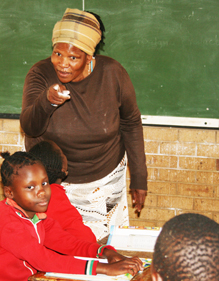|
Getting your Trinity Audio player ready...
|
 “What is that we are facing? Why are we restless and at times seeming very angry and frustrated?”
“What is that we are facing? Why are we restless and at times seeming very angry and frustrated?”
A few months ago in Witbank, Mpumalanga, Zwelinzima Vavi, the Cosatu secretary-general, asked these uncomfortable questions of his union members. He was referring to “the crisis in education, the declining quality of education and that the poor’s children remain trapped in inferior education with wholly inadequate infrastructure”.
Standing before Dalia Timane, a teacher at Vukanini Combined School in Bethal, a small town in the eastern province, it’s impossible not to think of Vavi’s words. Timane spoke to Corruption Watch from what appeared to be a kitchen, crammed to the brim with a group of senior teachers. Officially, it’s the staff room for heads of department (HODs) at Vukanini.
“We have a challenge with sitting accommodation; there aren’t enough offices. Even the chairs aren’t suitable – they’re too old, they scratch the teachers,” said Themba Mango, the principal.
One teacher, squashed in a corner, concentrated on marking work for her 200 Grade 8 pupils. But Timane grinned unexpectedly, oblivious to the dust in the room. Asked what tickled her when the environment was depressing – she was quick to answer. “I’m happy to be a teacher here. It’s better than staying at home and being unemployed. My learners appreciate my contribution and I enjoy teaching them,” she said.
Timane is a maths, arts and culture teacher, who takes grades 8 and 9. She hails from Limpopo, but found herself in Mpumalanga in search of greener teaching pastures. “When one hears of shortages in teaching, especially in maths and science, it’s easy to think one will get employment on graduating from a university or college, but that’s not true,” she explained.
Yet she downplayed the fact that she indeed discovered that the teaching grass was greener in Mpumalanga than in her home province – and boy did she begin by watering that grass so hard it nearly drove her nuts. That the teaching post she landed turned out to be more than what she had bargained for, she masked with her warm smile.
Poor salary
“From July to December last year my salary was R1 800 – with no benefits. I had to pay rent, buy food, take care of my three children and still send money back home,” she said. “I walked for about 4km from home to school and back, daily. I couldn’t afford taxi fare. I’d be so embarrassed when my learners asked why I didn’t take a taxi. I couldn’t tell them I didn’t earn enough money. I only told them I preferred to walk as part of exercise because I wanted to stay fit.”
She sighed heavily, but before Timane could explain that she was torn between practising what she studied and liked, and the harsh reality of her position, one HOD interjected, stating that clarity was needed regarding Timane’s salary.
“It’s important to note that this dedicated and qualified educator was paid only R1 800 by the parents able to contribute R20 monthly for her salary. The money didn’t come from the department of education. The school had exhausted all post establishments but we had learners who required her services. We begged her to assist and she agreed.”
While it is noble of Timane to make such an enormous sacrifice for the love of teaching, the nagging question is: with education budgets ballooning yearly, both provincially and nationally, is this really necessary?
In her 2012/2013 budget speech, Mpumalanga education MEC Reginah Mhaule asked for R13 983 862.
“You media people don’t know the conditions that teachers like us in small towns work under,” said another HOD. “All you care to report about is when we go on strike for better salaries.” The irritation was palpable.
Health hazard
The rooms where teaching takes place can only be loosely referred to as classrooms. The floors are potholed and the buildings are health hazards. Walking from one class to the next, losing count of the holes in the floors, witnessing teachers crisscross corridors heading to different classes, one can’t help but wonder if Gert Sibande, who was known as the “Lion of the East” by his ANC comrades, isn’t turning in his grave.
Bethal may be an ordinary small town to outsiders, but this dorpie, in Govan Mbeki Local Municipality, which forms part of the Gert Sibande District, has a rich political history. As a farm labourer in Bethal in the 1930s, Sibande founded a farm workers’ association and became the local spokesperson for the ANC. In 1953, he was deported from the town and charged with treason in 1956. He later skipped the country and died in Swaziland.
To calm flaring tempers, Mango pointed out that the department of education had helped to restore some dignity by refurbishing the school’s toilets in 2011. “We have been on the priority list for renovation prior to 1994. Yes, the conditions are not good but we hope our turn to be considered for more renovations will come,” he concluded.
The irony is that Timane and her colleagues work under these dire conditions while a few kilometres away at HM Swart Laerskool, a ghost teacher was paid her full salary and benefits for more than two years. Read the full story about this here.
That is the story of the South African education debacle: unlike ageing, when one doesn’t lose the number of years already accumulated, in education in our country, when officials talk about the gains made, it is difficult to count what has been lost through mismanagement, corruption and inefficiency.
What you can do
To report a problem in a state school, contact the National Department of Basic Education's tollfree hotline on 0800 202 933. Also, click here to find a useful handbook on school governance in South Africa.








